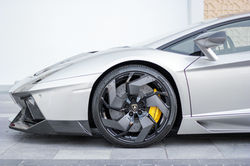
Surface Finishing in the Automotive Industry
Application Range
Industry-Specific Requirements
Steel still makes up more than 50% of the metals used in a vehicle and hence remains a key material for the automotive industry. However, other materials such as aluminum, magnesium, and fiber-reinforced plastics – for weight reduction and a resultant reduction in consumption and emissions – are quickly gaining ground.
Hydraulic components exhibit swarf and burrs due to the manufacturing process used (pressing, turning, milling, etc.). This can lead to massive system disruptions or even total system failure (ABS, ESP, and other systems). For uninterrupted functioning of these systems, deburring is essential.
In high-pressure systems (e.g., common rail), focus is on material strength and flow effects. Microcracks and ultrafine burrs in injection lines must be eliminated.
Apart from functional requirements, aesthetic requirements are also important quality criteria for certain parts, e.g., pinstriping, roof rails, protective moldings, etc. The electropolishing process makes an important contribution to the meeting of these criteria.
Our Solutions for the Automotive Industry
Part Deburring and Polishing, Surface Defect Removal
Unlike mechanical machining techniques (e.g., grinding and honing), chemical deburring does not involve mechanical loading and heating of part surfaces. With it, inaccessible edges and corners can be reached and treated very effectively. Roughness is reduced and surface defects are eliminated, leading to better part fatigue strength behavior.
Surface Finishing
Gloss, roughness, and cleaning and corrosion properties are optimized through electropolishing. A part can achieve its full functionality with an electropolished surface.
Part Passivation and Functional/Decorative Coloration
Titanium parts are fully passivated through anodization; coloration facilitates identification.
Protective Oxide Layer Thickening
In the manufacturing of products made of chromium and chromium–nickel stainless steel, an active surface is often formed. This surface is gradually converted into a thin, adherent oxide layer that protects the surface from corrosion. Through passivation, the protective oxide layer can be generated quickly and easily right after the product is manufactured.
For the automotive industry, ElpoChem offers surface treatments and surface finishing solutions for the following metals:
-
Carbon steel
Chemical deburring and polishing, pickling, passivating -
Stainless steel
Electropolishing, pickling, passivation -
Titanium, titanium alloys
Electropolishing, pickling, anodization, passivation -
Magnesium
Electropolishing, pickling
ElpoChem Services
-
Consulting, Conceptual Design, Project Planning
-
Sample processing
-
Process Engineering
-
Support for Customer Plants
(For a description of services, see ElpoChem, Services -->)
 |  |  |  |
|---|
